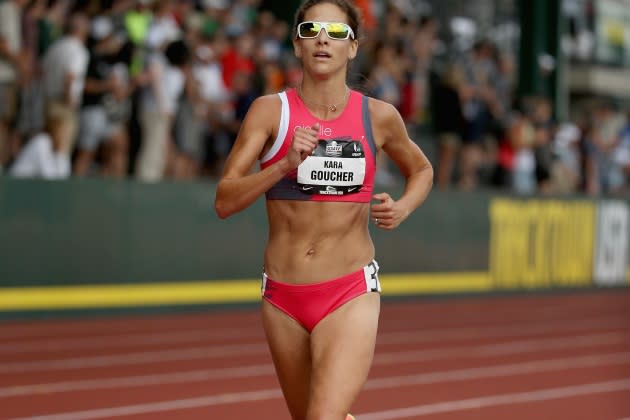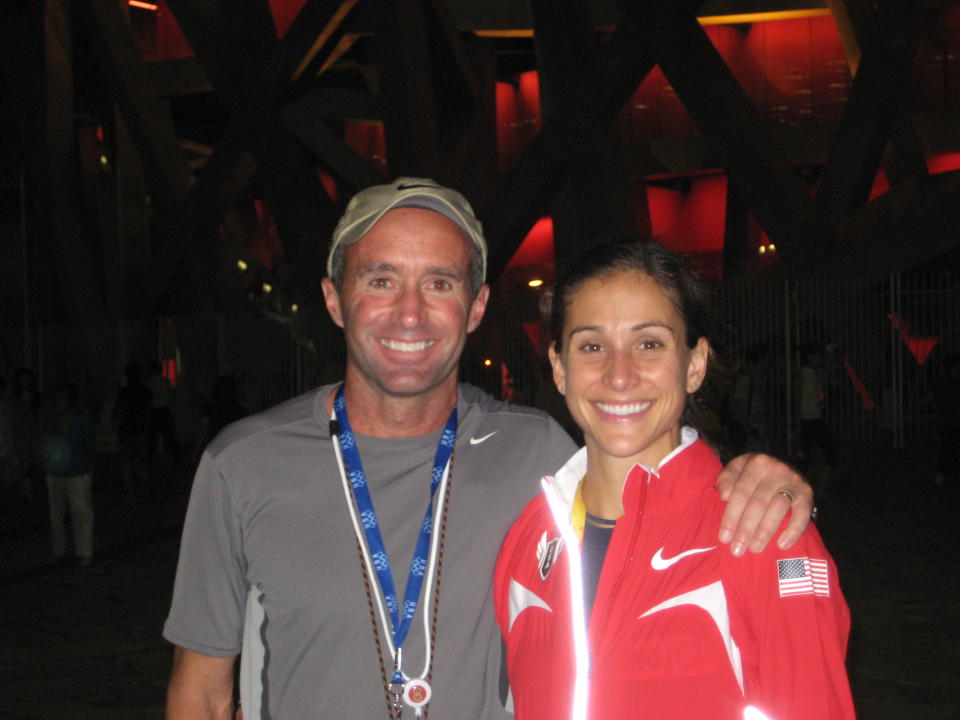Elite Runner Kara Goucher Really Wants Matt Damon to Read Her Book

Two-time Olympian and former Nike-endorsed athlete Kara Goucher had no intention of watching the film “Air.”
Goucher, who published her memoir, “The Longest Race: Inside the Secret World of Abuse, Doping, & Deception on Nike’s Elite Running Team,” last month, agreed to watch the feature about Nike’s signing of Michael Jordan for this interview. “It was a great sports story and I love sports stories,” she said. “At first, I thought, ‘Ugh, I don’t want to watch this.’ But then I got into it. I thought they did a good job. It wasn’t as hard as I thought it would be.”
More from WWD
Tiffany and Nike Collaboration: An Exclusive First Look at the Sneakers and Accessories
Red Carpet Looks at the 'She-Hulk: Attorney at Law' L.A. Premiere
Mostly though, the distance runner said she was “blown away” by how the film centered on a woman [Deloris Jordan, the basketball legend’s mother] and how much she mattered. “That was completely opposite of my experience as a Nike athlete and as a woman.”
Goucher’s Gallery Books-published book details her experience on the Nike-supported Oregon Project, including allegations of doping and sexual abuse by its coach Alberto Salazar. Goucher was the whistleblower, who testified formally about the doping that went on in the program — which she did not partake in. In 2021, Salazar was permanently banned from coaching by U.S. Center for SafeSport, after Goucher reported allegations of sexual misconduct. In 2019, he was banned by the U.S. Anti-Doping Agency for four years, and Nike folded the Oregon Project. Now sponsored by Oiselle and Altra, Goucher is a NBC Sports commentator and cofounder of the Clean Sport Collective.
Salazar has denied the sexual assault allegations.
One of the takeaways for Goucher from “Air,” which highlights how Sonny Vaccaro negotiated a Nike endorsement deal with Jordan, was how the legendary NBA star’s mother Deloris was portrayed with such high-regard and respect, who envisioned her son’s future and “was trusted by him to make the difficult decisions that his career and livelihood were dependent on,“ Goucher said. “She was celebrated in the film — and she is in real life — as being this really important person for not only Michael Jordan’s life, but also for basketball in America. That was really cool to see, but I couldn’t help but contrast that as to what my experience was as a working mother at Nike.”
A sponsored Nike athlete from 2001 to the end of 2013, Goucher first joined the Oregon Project in 2004. During her affiliation with Nike, she said “women were not celebrated like that [referring to the film’s portrayal of Deloris Jordan]. I didn’t feel the same sort of respect.”
Goucher said she would have “loved” if lead actor Matt Damon and director Ben Affleck had read her book before ”Air” was made. (She is trying to get copies of it to them.) “You’re glamorizing this brand. Would you want your daughters to be treated the way that they treated me?” she said.
In her book, Goucher alleged that Salazar inappropriately touched her on two occasions, while receiving a sports massage from the coach. Noting how Nike funded Salazar’s legal defense in the doping hearings in state court, Goucher said, “Is that the brand that you really want to put up on a pedestal?”
“Air” gives viewers “a sense for who Phil Knight is — he wants to get recognition for what he’s done, he’s very aggressive,” Goucher said. From her perspective, that reflects “the heart of the company, which is to win at all costs.” Moviegoers “see how they were hustling to build something together. Whereas now, it’s really all about marketing and just making money,” she claimed.
Her experience included being Photoshopped in an ad campaign to conceal her pregnancy, not being paid equally and “being told I got paid to run, not to do appearances,” she claimed.
Goucher said she grew used to what she described as “the culture of an all-boys club.” The company’s decision to suspend her pay during part of her pregnancy — despite having promoted her pregnancy — was the tipping point. She claimed that she had been asked not to post about her pregnancy on social media or to speak about it publicly, until the news was revealed in a front-page New York Times story on Mother’s Day 2011 that she had agreed to be interviewed for.
“On one hand, they were promoting me as a female athlete, who can do it all. But behind closed doors, they weren’t paying me [more than a month later], and they were telling me that I didn’t have value, because I wasn’t racing,” she said.
The public disclosure occurred halfway through her pregnancy, which was “a little later” than she would have preferred to share the news. She said, “But I thought, ‘Hey, Nike is supporting me. They know how important this is. Yeah, I was involved with The Times piece. I didn’t have a problem with The Times piece. I thought it was cool that they were promoting pregnancy on such a big stage. I was an athlete. During that time, I was really excited. I thought I was working with a brand that was celebrating motherhood and athleticism together.”
A month later, she said that Nike stopped paying her.
“Just a fan like everyone else,” Goucher has never met Jordan or his mother. ”Air” depicts just what happened — all the dealmaking was done by men, aside from Jordan’s mother. “They showed the culture as it is. The men had all the power. She was this one person that held them to a different standard.”
As for Nike’s efforts to improve diversity, ensure pay equity, promote more women to senior roles and its policy to pay pregnant sponsored athletes, Goucher said, “It’s an athletic brand company. Women make up 50 percent of the marathon majors — sometimes more than 50 percent. How come it isn’t 50-50 across the board? Why do they have to put this thing forward slowly and incrementally hire women? We know what we’re doing in the sports industry.”
FY21 representation of women in Nike’s global corporate workforce was 50.4 percent and that inched up by 0.7 percentage points to 51.1 percent in FY22. During that same time frame, Nike went from 43 percent of women in leadership positions to 44.1 percent in FY22 — 0.9 percentage point shy of the $47.6 billion company’s 2025 target of 45 percent.
Claiming how “dozens” of female athletes “were really harmed by those contracts and how they were structured,” Goucher said she wound up with a femur stress fracture because she had to return to running to fulfill her contract obligations. “There’s never any acknowledgement of what happened in the past. It’s great that you’re moving forward, but let’s acknowledge what happened and the people that you harmed along the way,” she said.
Goucher does not think that is likely to happen. “But I think it could go a really, long way for the women, who have been harmed,” she said.
Referring to an internal investigation into Salazar in 2020 conducted by Nike, Goucher said she, Mary Cain and Amy Begley were asked to participate. (In 2020, Cain filed a $20 million lawsuit against Salazar and Nike.) Goucher said the three athletes had offered to be part of an independent investigation, but not an internal one. Goucher claimed that Nike declined to do so, and the company had allegedly agreed to if something was found in the internal investigation.
“They found nothing wrong. That doesn’t help us heal or the sport or the culture move forward. There were obviously wrongdoings. You could be using us as a resource for how to move forward in a better fashion,” Goucher said.
As for whether that is likely, Goucher said, “I don’t think that I will ever get that acknowledgement. But I hold out hope. There are a lot of great people at Nike. I hold out hope that some of them will eventually get more power. And they will be able to steer the company in a more ethical stance.”

As for Nike trying to market a more inclusive image by using models and mannequins of varying sizes and ages, Goucher said, “It’s progress. Most brands have been doing that. I run for a company called Oiselle, a women’s-led apparel company. We’ve been doing that for years. The reality is all athletes do not look the same. That’s important. The thing with Nike is they have so much power. They are the industry leader. They could be using that for good,” said Goucher, emphasizing the importance of having more female and diverse decision-makers.
Asked about former Nike president and chief executive officer Mark Parker joining The Walt Disney Co. as chairman earlier this year, Goucher said she has always liked him and that he was always very good to her and her fellow elite runner husband Adam. “Obviously, during the pregnancy thing I lost some of my respect for him. He chose brand loyalty over what I thought was the right decision. But I think he was a good leader.”
However, Goucher said she was “disappointed” to learn, during the Oregon Project investigation, that he had been privy to Salazar’s testing of testosterone on select athletes. The USADA revealed in 2019 that Parker had been briefed about performance-enhancing experiments. “All of that aside, I do believe that Mark Parker is a good leader — so good for him.”
Suggesting what Nike might do, Goucher asked, “Why aren’t women writing the contracts? They need to listen more to their athletes who have been through it. I really appreciate [soccer pro] Alex Morgan being very public, when she re-signed her contract that she wanted pregnancy protection extended [and got it for 18 months]. We need people of power to speak on this and not shy away from saying mistakes have been made. What are we going to do to make sure this doesn’t happen again…We need to be able to have these conversations to move forward. Nike has the ability to do that. That just have to make the right choice. They just need to do it. [That’s] their own slogan.”
Always working to get more people involved with running, Goucher enthused about this month’s Boston Marathon. “Maybe it’s just a matter that it had been building back up, since COVID[-19]. It was just fantastic. The races were spectacular. The three days leading up to the Boston Marathon, you could go outside your hotel and feel that the city was buzzing. Boston has a very soft spot in my heart [having run what was her fastest marathon seven months after giving birth to her son Colt], so I was very happy to be there. It was electric. It was the best of what running can be as a community builder.”
Best of WWD


